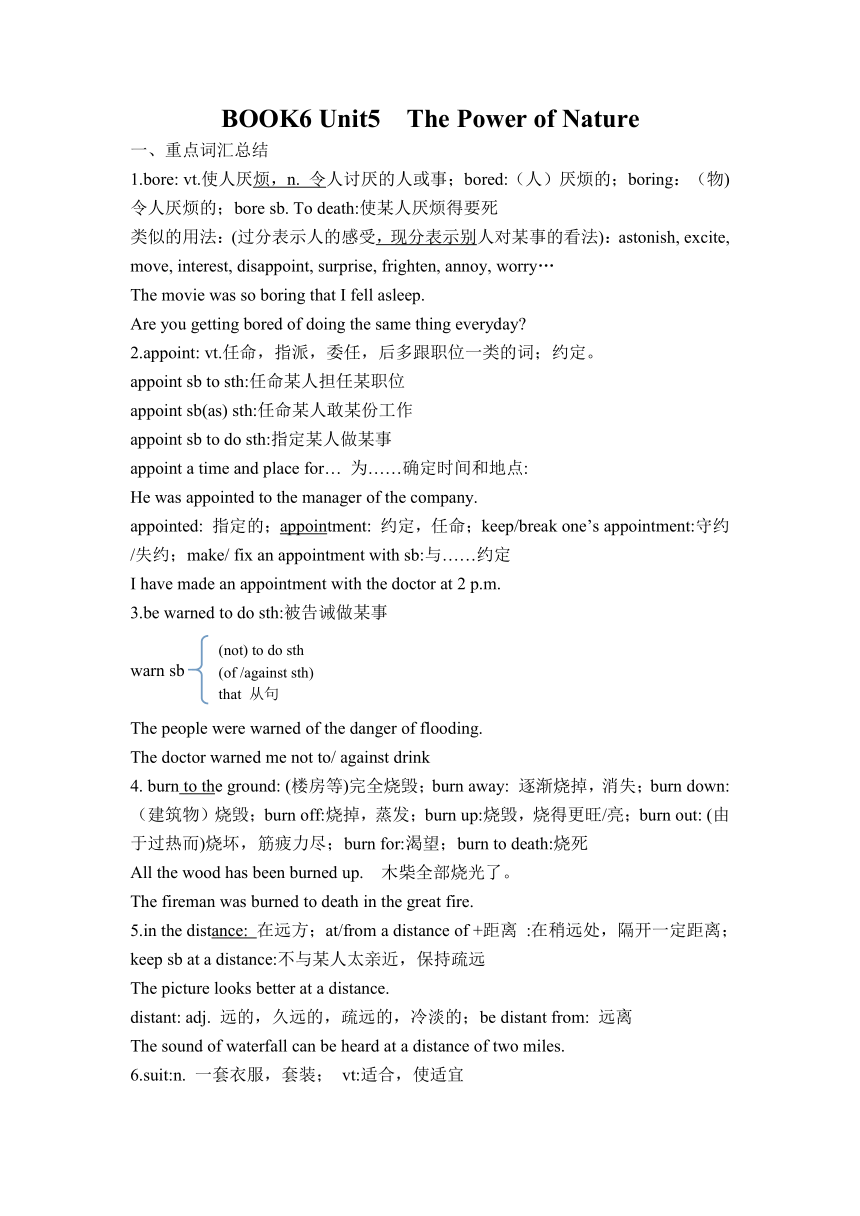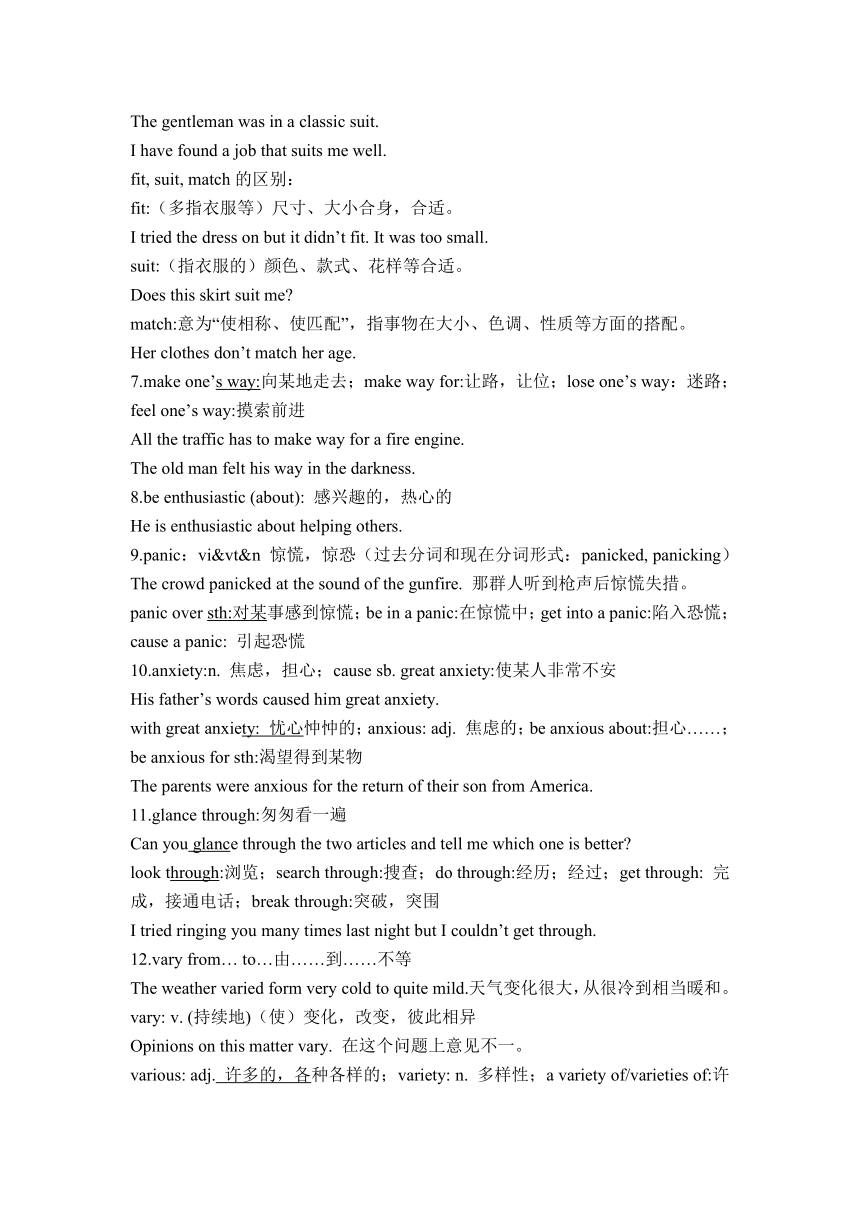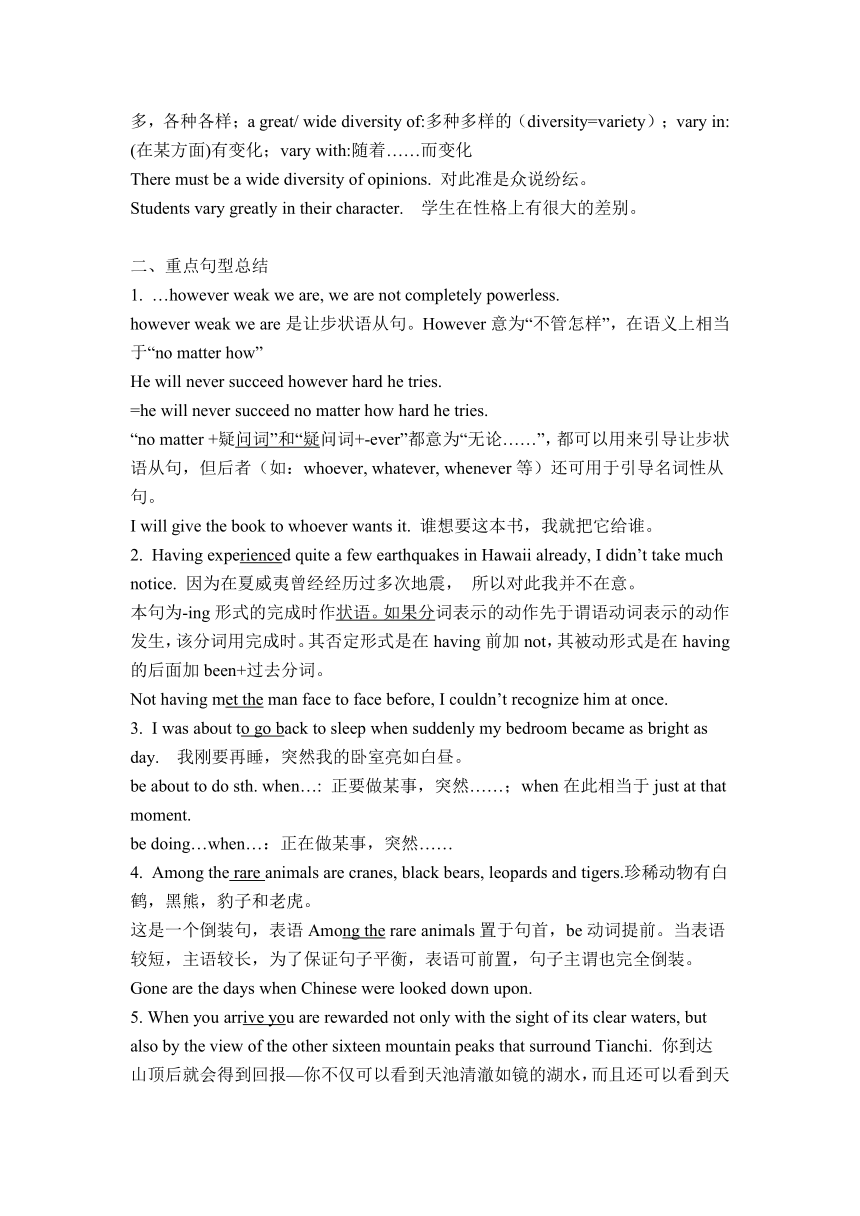人教版高中英语(教案)BOOK6 Unit5 The Power of Nature
文档属性
| 名称 | 人教版高中英语(教案)BOOK6 Unit5 The Power of Nature |

|
|
| 格式 | zip | ||
| 文件大小 | 40.7KB | ||
| 资源类型 | 教案 | ||
| 版本资源 | 人教版(新课程标准) | ||
| 科目 | 英语 | ||
| 更新时间 | 2016-08-11 00:00:00 | ||
图片预览



文档简介
BOOK6
Unit5
The
Power
of
Nature
重点词汇总结
1.bore:
vt.使人厌烦,n.
令
( http: / / www.21cnjy.com )人讨厌的人或事;bored:(人)厌烦的;boring:(物)令人厌烦的;bore
sb.
To
death:使某人厌烦得要死
类似的用法:(过分表示人的感受,现分表示别
( http: / / www.21cnjy.com )人对某事的看法):astonish,
excite,
move,
interest,
disappoint,
surprise,
frighten,
annoy,
worry…
The
movie
was
so
boring
that
I
fell
asleep.
Are
you
getting
bored
of
doing
the
same
thing
everyday
2.appoint:
vt.任命,指派,委任,后多跟职位一类的词;约定。
appoint
sb
to
sth:任命某人担任某职位
appoint
sb(as)
sth:任命某人敢某份工作
appoint
sb
to
do
sth:指定某人做某事
appoint
a
time
and
place
for…
为……确定时间和地点:
He
was
appointed
to
the
manager
of
the
company.
appointed:
指定的;appoin
( http: / / www.21cnjy.com )tment:
约定,任命;keep/break
one’s
appointment:守约/失约;make/
fix
an
appointment
with
sb:与……约定
I
have
made
an
appointment
with
the
doctor
at
2
p.m.
3.be
warned
to
do
sth:被告诫做某事
warn
sb
The
people
were
warned
of
the
danger
of
flooding.
The
doctor
warned
me
not
to/
against
drink
4.
burn
to
th
( http: / / www.21cnjy.com )e
ground:
(楼房等)完全烧毁;burn
away:
逐渐烧掉,消失;burn
down:
(建筑物)烧毁;burn
off:烧掉,蒸发;burn
up:烧毁,烧得更旺/亮;burn
out:
(由于过热而)烧坏,筋疲力尽;burn
for:渴望;burn
to
death:烧死
All
the
wood
has
been
burned
up.
木柴全部烧光了。
The
fireman
was
burned
to
death
in
the
great
fire.
5.in
the
distance:
( http: / / www.21cnjy.com )在远方;at/from
a
distance
of
+距离
:在稍远处,隔开一定距离;keep
sb
at
a
distance:不与某人太亲近,保持疏远
The
picture
looks
better
at
a
distance.
distant:
adj.
远的,久远的,疏远的,冷淡的;be
distant
from:
远离
The
sound
of
waterfall
can
be
heard
at
a
distance
of
two
miles.
6.suit:n.
一套衣服,套装;
vt:适合,使适宜
The
gentleman
was
in
a
classic
suit.
I
have
found
a
job
that
suits
me
well.
fit,
suit,
match的区别:
fit:(多指衣服等)尺寸、大小合身,合适。
I
tried
the
dress
on
but
it
didn’t
fit.
It
was
too
small.
suit:(指衣服的)颜色、款式、花样等合适。
Does
this
skirt
suit
me
match:意为“使相称、使匹配”,指事物在大小、色调、性质等方面的搭配。
Her
clothes
don’t
match
her
age.
7.make
one’s
way:
( http: / / www.21cnjy.com )向某地走去;make
way
for:让路,让位;lose
one’s
way:迷路;feel
one’s
way:摸索前进
All
the
traffic
has
to
make
way
for
a
fire
engine.
The
old
man
felt
his
way
in
the
darkness.
8.be
enthusiastic
(about):
感兴趣的,热心的
He
is
enthusiastic
about
helping
others.
9.panic:vi&vt&n
惊慌,惊恐(过去分词和现在分词形式:panicked,
panicking)
The
crowd
panicked
at
the
sound
of
the
gunfire.
那群人听到枪声后惊慌失措。
panic
over
sth:对某
( http: / / www.21cnjy.com )事感到惊慌;be
in
a
panic:在惊慌中;get
into
a
panic:陷入恐慌;cause
a
panic:
引起恐慌
10.anxiety:n.
焦虑,担心;cause
sb.
great
anxiety:使某人非常不安
His
father’s
words
caused
him
great
anxiety.
with
great
anxiety:
忧心
( http: / / www.21cnjy.com )忡忡的;anxious:
adj.
焦虑的;be
anxious
about:担心……;be
anxious
for
sth:渴望得到某物
The
parents
were
anxious
for
the
return
of
their
son
from
America.
11.glance
through:匆匆看一遍
Can
you
glanc
( http: / / www.21cnjy.com )e
through
the
two
articles
and
tell
me
which
one
is
better
look
through
( http: / / www.21cnjy.com ):浏览;search
through:搜查;do
through:经历;经过;get
through:
完成,接通电话;break
through:突破,突围
I
tried
ringing
you
many
times
last
night
but
I
couldn’t
get
through.
12.vary
from…
to…由……到……不等
The
weather
varied
form
very
cold
to
quite
mild.天气变化很大,从很冷到相当暖和。
vary:
v.
(持续地)(使)变化,改变,彼此相异
Opinions
on
this
matter
vary.
在这个问题上意见不一。
various:
adj.
许多的,各
( http: / / www.21cnjy.com )种各样的;variety:
n.
多样性;a
variety
of/varieties
of:许多,各种各样;a
great/
wide
diversity
of:多种多样的(diversity=variety);vary
in:
(在某方面)有变化;vary
with:随着……而变化
There
must
be
a
wide
diversity
of
opinions.
对此准是众说纷纭。
Students
vary
greatly
in
their
character.
学生在性格上有很大的差别。
重点句型总结
…however
weak
we
are,
we
are
not
completely
powerless.
however
weak
we
are是让步状语从句。However意为“不管怎样”,在语义上相当于“no
matter
how”
He
will
never
succeed
however
hard
he
tries.
=he
will
never
succeed
no
matter
how
hard
he
tries.
“no
matter
+疑问词”和“疑
( http: / / www.21cnjy.com )问词+-ever”都意为“无论……”,都可以用来引导让步状语从句,但后者(如:whoever,
whatever,
whenever等)还可用于引导名词性从句。
I
will
give
the
book
to
whoever
wants
it.
谁想要这本书,我就把它给谁。
Having
experience
( http: / / www.21cnjy.com )d
quite
a
few
earthquakes
in
Hawaii
already,
I
didn’t
take
much
notice.
因为在夏威夷曾经经历过多次地震,
所以对此我并不在意。
本句为-ing形式的完成时作状语。如果分
( http: / / www.21cnjy.com )词表示的动作先于谓语动词表示的动作发生,该分词用完成时。其否定形式是在having前加not,其被动形式是在having的后面加been+过去分词。
Not
having
met
the
( http: / / www.21cnjy.com )
man
face
to
face
before,
I
couldn’t
recognize
him
at
once.
I
was
about
to
go
b
( http: / / www.21cnjy.com )ack
to
sleep
when
suddenly
my
bedroom
became
as
bright
as
day.
我刚要再睡,突然我的卧室亮如白昼。
be
about
to
do
sth.
when…:
正要做某事,突然……;when在此相当于just
at
that
moment.
be
doing…when…:正在做某事,突然……
Among
the
rare
( http: / / www.21cnjy.com )animals
are
cranes,
black
bears,
leopards
and
tigers.珍稀动物有白鹤,黑熊,豹子和老虎。
这是一个倒装句,表语Among
the
( http: / / www.21cnjy.com )
rare
animals置于句首,be动词提前。当表语较短,主语较长,为了保证句子平衡,表语可前置,句子主谓也完全倒装。
Gone
are
the
days
when
Chinese
were
looked
down
upon.
5.
When
you
arrive
yo
( http: / / www.21cnjy.com )u
are
rewarded
not
only
with
the
sight
of
its
clear
waters,
but
also
by
the
view
of
the
other
sixteen
mountain
peaks
that
surround
Tianchi.
你到达山顶后就会得到回报—你不仅可以看到天池清澈如镜的湖水,而且还可以看到天池四周的16座山峰。
not
only…but
also…意为“不但……而且……”,前后连接的词的词性必须对等。
They
not
only
( http: / / www.21cnjy.com )broke
into
his
office
and
stole
his
books,
but
also
tore
up
his
manuscripts.
not
only…放在句首,后接句子时要用部分倒装结构。
Not
only
had
the
po
( http: / / www.21cnjy.com )or
man
been
fined,
but
also
he
had
been
sent
to
prison.
not
only…but
also…连接两个主语时,谓语动词要遵循“就近原则”
Not
only
the
students
but
also
the
teacher
was
invited.
It
is
said
that
thi
( http: / / www.21cnjy.com )s
boy,
who
had
a
great
gift
for
languages
and
persuasion,
is
the
father
of
the
Manchu
people.据说,这个男孩是满族人的祖先,他具有语言天赋和很强的说服力。
it
is
said
that…“据说……”。在这一结构中it是形式主语,真正的主语是that引导的主语从句。类似的用法有:
it
is
expected
that…人们预料到……
it
is
reported
that…
据报道……
it
is
believed/thought
that…人们认为……
it
is
hoped
that…人们希望……
have
a
gift
for
对……有天赋
三、重点语法总结
Grammar:
Revise
the
–ing
form
(一)动词-ing用法图解
Step7:
当堂导练
I.
完成句子
________________________(很遗憾)
you
missed
the
exciting
football
match.
_________________________(据报道)16
people
were
killed
in
the
accident.
____________________________(很重要)
to
master
a
foreign
language.
_________________________(没有用处)
arguing
about
the
matter
with
him.
__________________________(我从未想到)
that
he
might
be
in
trouble.
I
found
_______________________________________
in
a
week.(finish)
我发现一周内完成我们的工作很难。
___________________________________
they
should
start
early.(suggest)
_____________________________crying
over
spilt
milk.(use)
(二)解析动词-ing的基本用法
1.
作主语:此时的-ing是动名词,看成单数,常用it作形式主语,把v-ing放于句末。常见句型有:
It
be
a
waste+v.-ing;
It
be
no
good/use+v.-ing;
There
be
no
sense
in+v.-ing;
There
be
no
point
in+v.-ing
It
is
a
waste
of
time
persuading
such
a
person
to
join
us.
2.
作宾语:此时的v.-ing为动名词
( http: / / www.21cnjy.com ),常出现在某些不能用不定式作宾语的动词后。如:enjoy,
advise,
admit,
appreciate,
forbid,
feel
like,
be
accustomed
to等后。
I
can’t
imagine
working
outdoors
in
such
a
cold
day.
3.
作定语:此时的v.-ing既可以是动名
( http: / / www.21cnjy.com )词,也可以是现在分词。但动名词放在所修饰的名词前作为定语表示该名词的用途或有关的动作;而现在分词作定语则用于说明所修饰名词正在进行的动作。
dining
room(动名词)
a
waiting
room(动名词)
a
waiting
man(现在分词)
4.
作表语:此时的v.-ing既可
( http: / / www.21cnjy.com )以是动名词,也可以是现在分词。动名词作表语是对主语内容的解释,这时主语与表语位置可以互换;现在分词作表语,表明的是主语的性质与特征,主语与表语的位置不能互换。
Our
job
is
playing
all
kinds
of
music.(动名词作表语)
=Playing
all
kind
of
music
is
our
job.
The
music
they
are
playing
sounds
exciting.(现在分词作表语)
What
he
did
yesterday
was
amazing.(现在分词作表语)
5.
作宾语补足语:此时的v.-ing是现在分词,主要用于以下两类动词后构成宾语补足语。
感官动词,如:see,
hear,
feel,
smell,
watch,
find,
notice等。
I
felt
someone
patting
on
the
shoulder.
使役动词,如have,keep,
leave等。
I
am
sorry
to
have
kept
you
waiting
long.
The
young
mother
left
her
baby
crying.
6.
作状语:此时的v.-ing是现在分词。-ing形式作状语,可以表示时间、原因、结果、条件、让步、行为方式、伴随状语等。
Crossing
the
road,
he
was
run
over
by
a
car.(时间状语)
Not
knowing
Chinese,
he
couldn’t
understand
the
film.(原因状语)
Working
hard,
you
will
pass
the
exam.(条件状语)
The
children
went
into
the
classroom,
talking
and
laughing.(伴随状语)
His
parents
died
in
the
war,
leaving
him
an
orphan.(结果状语)
补充:分词(短语)作状语时,其逻辑主语
( http: / / www.21cnjy.com )必须与句子的主语保持一致,如果不一致,必须用独立主格结构来表示,也就是在分词前面加上它自己的主语。Finding
her
car
stolen,
she
hurried
to
a
policeman
for
help.(分词作状语)
The
train
having
gone,
we
had
to
wait
another
day.(独立主格)
(三)-ing形式的完成式
主动:Having+过去分词……,主语+谓语。
Having
answered
the
letter,
she
went
on
to
read
an
English
novel.
-ing形式的完成式所表示的动作发生在句子中谓语动词所表示的动作之前。
被动:(Having
been)+过去分词……,主语+谓语。
Having
been
shown
the
lab,
we
were
taken
to
see
the
library.
-ing的完成被动式所表示的动作与逻辑主语之间是被动关系,发生在句中谓语动词所表示的动作之前。
(四)-ing形式的否定式
其基本结构是:not+-ing形式(无论在完成式还是被动式里,not必须置于-ing之前)
Not
having
finished
( http: / / www.21cnjy.com )his
homework,
the
boy
was
still
doing
it
in
the
classroom.
巩固练习
I.
完成句子
1.每天做相同的事,他渐渐地感到厌烦。
He
was
getting
_______
______
doing
the
same
thing
every
day.
那场大火之后,他的房子被烧毁了。
After
the
fire,
his
house
was
______
____
______
________.
我看见远处的他在向我们招手。
I
saw
him
waving
his
hand
to
us
____
_____
__________.
4.他对教师的工作非常地热心。
He
_____
__________
_______
his
job
as
a
teacher.
5.他总是戴着墨镜,保护他的眼镜免受阳光的伤害。
He
always
wears
sunglasses
to
_______
his
eyes
_______sunshine.
看到警察,小偷快速逃跑了。
_________
________
the
policeman,
the
thief
ran
away
quickly.
7.
I
was
_______
to
talk
about
this
question
______
you
interrupted
me.
References:
1.
bor
( http: / / www.21cnjy.com )ed/tired
of
2.burnt
to
the
ground
3.in
the
distance
4.was
enthusiastic
( http: / / www.21cnjy.com )about
5.protect…
from…
6.Having
seen/After
seeing
7.about,
when
II.
用括号内所给动词的正确形式填空。
____________(live)
in
a
southern
city
of
China,
I
have
never
seen
such
a
wonderful
snow
view.
________
_________
_________(not
grow)
up
yet,
you’re
not
allowed
to
enter
the
bars.
_____________(encoura
( http: / / www.21cnjy.com )ge)
by
the
director,
the
actors
performed
wonderfully
in
the
play.
___________(know)
all
this,
they
made
me
pay
for
the
damage.
The
students
are
sitti
( http: / / www.21cnjy.com )ng
in
the
reading-room,
___________(read)all
kinds
of
books.
___________(tire)
and
thirsty,
they
stopped
to
search
for
some
water.
The
mother
ran
after
h
( http: / / www.21cnjy.com )er
naughty
son,
___________(order)
him
to
come
back.
_________
________in
the
factory
for
nearly
ten
years,
he
is
considering
changing
a
job.
References
1.
Li
( http: / / www.21cnjy.com )ving
2.
Not
having
grown
3.
Encouraged
4.
Knowing
5.reading
6.
Tired
7.ordering
8.
Having
worked
(not)
to
do
sth
(of
/against
sth)
that
从句
作主语
动词-ing
作宾语
一般式:v-ing…,主语+谓语
动名词
作定语
完成式
作表语
主动:having+p.p
被动:having
been+p.p
作状语
一般式:not+-ing
否定式
作表语
现在分词
完成式:not+having+(been)+p.p
作宾补
作定语
Unit5
The
Power
of
Nature
重点词汇总结
1.bore:
vt.使人厌烦,n.
令
( http: / / www.21cnjy.com )人讨厌的人或事;bored:(人)厌烦的;boring:(物)令人厌烦的;bore
sb.
To
death:使某人厌烦得要死
类似的用法:(过分表示人的感受,现分表示别
( http: / / www.21cnjy.com )人对某事的看法):astonish,
excite,
move,
interest,
disappoint,
surprise,
frighten,
annoy,
worry…
The
movie
was
so
boring
that
I
fell
asleep.
Are
you
getting
bored
of
doing
the
same
thing
everyday
2.appoint:
vt.任命,指派,委任,后多跟职位一类的词;约定。
appoint
sb
to
sth:任命某人担任某职位
appoint
sb(as)
sth:任命某人敢某份工作
appoint
sb
to
do
sth:指定某人做某事
appoint
a
time
and
place
for…
为……确定时间和地点:
He
was
appointed
to
the
manager
of
the
company.
appointed:
指定的;appoin
( http: / / www.21cnjy.com )tment:
约定,任命;keep/break
one’s
appointment:守约/失约;make/
fix
an
appointment
with
sb:与……约定
I
have
made
an
appointment
with
the
doctor
at
2
p.m.
3.be
warned
to
do
sth:被告诫做某事
warn
sb
The
people
were
warned
of
the
danger
of
flooding.
The
doctor
warned
me
not
to/
against
drink
4.
burn
to
th
( http: / / www.21cnjy.com )e
ground:
(楼房等)完全烧毁;burn
away:
逐渐烧掉,消失;burn
down:
(建筑物)烧毁;burn
off:烧掉,蒸发;burn
up:烧毁,烧得更旺/亮;burn
out:
(由于过热而)烧坏,筋疲力尽;burn
for:渴望;burn
to
death:烧死
All
the
wood
has
been
burned
up.
木柴全部烧光了。
The
fireman
was
burned
to
death
in
the
great
fire.
5.in
the
distance:
( http: / / www.21cnjy.com )在远方;at/from
a
distance
of
+距离
:在稍远处,隔开一定距离;keep
sb
at
a
distance:不与某人太亲近,保持疏远
The
picture
looks
better
at
a
distance.
distant:
adj.
远的,久远的,疏远的,冷淡的;be
distant
from:
远离
The
sound
of
waterfall
can
be
heard
at
a
distance
of
two
miles.
6.suit:n.
一套衣服,套装;
vt:适合,使适宜
The
gentleman
was
in
a
classic
suit.
I
have
found
a
job
that
suits
me
well.
fit,
suit,
match的区别:
fit:(多指衣服等)尺寸、大小合身,合适。
I
tried
the
dress
on
but
it
didn’t
fit.
It
was
too
small.
suit:(指衣服的)颜色、款式、花样等合适。
Does
this
skirt
suit
me
match:意为“使相称、使匹配”,指事物在大小、色调、性质等方面的搭配。
Her
clothes
don’t
match
her
age.
7.make
one’s
way:
( http: / / www.21cnjy.com )向某地走去;make
way
for:让路,让位;lose
one’s
way:迷路;feel
one’s
way:摸索前进
All
the
traffic
has
to
make
way
for
a
fire
engine.
The
old
man
felt
his
way
in
the
darkness.
8.be
enthusiastic
(about):
感兴趣的,热心的
He
is
enthusiastic
about
helping
others.
9.panic:vi&vt&n
惊慌,惊恐(过去分词和现在分词形式:panicked,
panicking)
The
crowd
panicked
at
the
sound
of
the
gunfire.
那群人听到枪声后惊慌失措。
panic
over
sth:对某
( http: / / www.21cnjy.com )事感到惊慌;be
in
a
panic:在惊慌中;get
into
a
panic:陷入恐慌;cause
a
panic:
引起恐慌
10.anxiety:n.
焦虑,担心;cause
sb.
great
anxiety:使某人非常不安
His
father’s
words
caused
him
great
anxiety.
with
great
anxiety:
忧心
( http: / / www.21cnjy.com )忡忡的;anxious:
adj.
焦虑的;be
anxious
about:担心……;be
anxious
for
sth:渴望得到某物
The
parents
were
anxious
for
the
return
of
their
son
from
America.
11.glance
through:匆匆看一遍
Can
you
glanc
( http: / / www.21cnjy.com )e
through
the
two
articles
and
tell
me
which
one
is
better
look
through
( http: / / www.21cnjy.com ):浏览;search
through:搜查;do
through:经历;经过;get
through:
完成,接通电话;break
through:突破,突围
I
tried
ringing
you
many
times
last
night
but
I
couldn’t
get
through.
12.vary
from…
to…由……到……不等
The
weather
varied
form
very
cold
to
quite
mild.天气变化很大,从很冷到相当暖和。
vary:
v.
(持续地)(使)变化,改变,彼此相异
Opinions
on
this
matter
vary.
在这个问题上意见不一。
various:
adj.
许多的,各
( http: / / www.21cnjy.com )种各样的;variety:
n.
多样性;a
variety
of/varieties
of:许多,各种各样;a
great/
wide
diversity
of:多种多样的(diversity=variety);vary
in:
(在某方面)有变化;vary
with:随着……而变化
There
must
be
a
wide
diversity
of
opinions.
对此准是众说纷纭。
Students
vary
greatly
in
their
character.
学生在性格上有很大的差别。
重点句型总结
…however
weak
we
are,
we
are
not
completely
powerless.
however
weak
we
are是让步状语从句。However意为“不管怎样”,在语义上相当于“no
matter
how”
He
will
never
succeed
however
hard
he
tries.
=he
will
never
succeed
no
matter
how
hard
he
tries.
“no
matter
+疑问词”和“疑
( http: / / www.21cnjy.com )问词+-ever”都意为“无论……”,都可以用来引导让步状语从句,但后者(如:whoever,
whatever,
whenever等)还可用于引导名词性从句。
I
will
give
the
book
to
whoever
wants
it.
谁想要这本书,我就把它给谁。
Having
experience
( http: / / www.21cnjy.com )d
quite
a
few
earthquakes
in
Hawaii
already,
I
didn’t
take
much
notice.
因为在夏威夷曾经经历过多次地震,
所以对此我并不在意。
本句为-ing形式的完成时作状语。如果分
( http: / / www.21cnjy.com )词表示的动作先于谓语动词表示的动作发生,该分词用完成时。其否定形式是在having前加not,其被动形式是在having的后面加been+过去分词。
Not
having
met
the
( http: / / www.21cnjy.com )
man
face
to
face
before,
I
couldn’t
recognize
him
at
once.
I
was
about
to
go
b
( http: / / www.21cnjy.com )ack
to
sleep
when
suddenly
my
bedroom
became
as
bright
as
day.
我刚要再睡,突然我的卧室亮如白昼。
be
about
to
do
sth.
when…:
正要做某事,突然……;when在此相当于just
at
that
moment.
be
doing…when…:正在做某事,突然……
Among
the
rare
( http: / / www.21cnjy.com )animals
are
cranes,
black
bears,
leopards
and
tigers.珍稀动物有白鹤,黑熊,豹子和老虎。
这是一个倒装句,表语Among
the
( http: / / www.21cnjy.com )
rare
animals置于句首,be动词提前。当表语较短,主语较长,为了保证句子平衡,表语可前置,句子主谓也完全倒装。
Gone
are
the
days
when
Chinese
were
looked
down
upon.
5.
When
you
arrive
yo
( http: / / www.21cnjy.com )u
are
rewarded
not
only
with
the
sight
of
its
clear
waters,
but
also
by
the
view
of
the
other
sixteen
mountain
peaks
that
surround
Tianchi.
你到达山顶后就会得到回报—你不仅可以看到天池清澈如镜的湖水,而且还可以看到天池四周的16座山峰。
not
only…but
also…意为“不但……而且……”,前后连接的词的词性必须对等。
They
not
only
( http: / / www.21cnjy.com )broke
into
his
office
and
stole
his
books,
but
also
tore
up
his
manuscripts.
not
only…放在句首,后接句子时要用部分倒装结构。
Not
only
had
the
po
( http: / / www.21cnjy.com )or
man
been
fined,
but
also
he
had
been
sent
to
prison.
not
only…but
also…连接两个主语时,谓语动词要遵循“就近原则”
Not
only
the
students
but
also
the
teacher
was
invited.
It
is
said
that
thi
( http: / / www.21cnjy.com )s
boy,
who
had
a
great
gift
for
languages
and
persuasion,
is
the
father
of
the
Manchu
people.据说,这个男孩是满族人的祖先,他具有语言天赋和很强的说服力。
it
is
said
that…“据说……”。在这一结构中it是形式主语,真正的主语是that引导的主语从句。类似的用法有:
it
is
expected
that…人们预料到……
it
is
reported
that…
据报道……
it
is
believed/thought
that…人们认为……
it
is
hoped
that…人们希望……
have
a
gift
for
对……有天赋
三、重点语法总结
Grammar:
Revise
the
–ing
form
(一)动词-ing用法图解
Step7:
当堂导练
I.
完成句子
________________________(很遗憾)
you
missed
the
exciting
football
match.
_________________________(据报道)16
people
were
killed
in
the
accident.
____________________________(很重要)
to
master
a
foreign
language.
_________________________(没有用处)
arguing
about
the
matter
with
him.
__________________________(我从未想到)
that
he
might
be
in
trouble.
I
found
_______________________________________
in
a
week.(finish)
我发现一周内完成我们的工作很难。
___________________________________
they
should
start
early.(suggest)
_____________________________crying
over
spilt
milk.(use)
(二)解析动词-ing的基本用法
1.
作主语:此时的-ing是动名词,看成单数,常用it作形式主语,把v-ing放于句末。常见句型有:
It
be
a
waste+v.-ing;
It
be
no
good/use+v.-ing;
There
be
no
sense
in+v.-ing;
There
be
no
point
in+v.-ing
It
is
a
waste
of
time
persuading
such
a
person
to
join
us.
2.
作宾语:此时的v.-ing为动名词
( http: / / www.21cnjy.com ),常出现在某些不能用不定式作宾语的动词后。如:enjoy,
advise,
admit,
appreciate,
forbid,
feel
like,
be
accustomed
to等后。
I
can’t
imagine
working
outdoors
in
such
a
cold
day.
3.
作定语:此时的v.-ing既可以是动名
( http: / / www.21cnjy.com )词,也可以是现在分词。但动名词放在所修饰的名词前作为定语表示该名词的用途或有关的动作;而现在分词作定语则用于说明所修饰名词正在进行的动作。
dining
room(动名词)
a
waiting
room(动名词)
a
waiting
man(现在分词)
4.
作表语:此时的v.-ing既可
( http: / / www.21cnjy.com )以是动名词,也可以是现在分词。动名词作表语是对主语内容的解释,这时主语与表语位置可以互换;现在分词作表语,表明的是主语的性质与特征,主语与表语的位置不能互换。
Our
job
is
playing
all
kinds
of
music.(动名词作表语)
=Playing
all
kind
of
music
is
our
job.
The
music
they
are
playing
sounds
exciting.(现在分词作表语)
What
he
did
yesterday
was
amazing.(现在分词作表语)
5.
作宾语补足语:此时的v.-ing是现在分词,主要用于以下两类动词后构成宾语补足语。
感官动词,如:see,
hear,
feel,
smell,
watch,
find,
notice等。
I
felt
someone
patting
on
the
shoulder.
使役动词,如have,keep,
leave等。
I
am
sorry
to
have
kept
you
waiting
long.
The
young
mother
left
her
baby
crying.
6.
作状语:此时的v.-ing是现在分词。-ing形式作状语,可以表示时间、原因、结果、条件、让步、行为方式、伴随状语等。
Crossing
the
road,
he
was
run
over
by
a
car.(时间状语)
Not
knowing
Chinese,
he
couldn’t
understand
the
film.(原因状语)
Working
hard,
you
will
pass
the
exam.(条件状语)
The
children
went
into
the
classroom,
talking
and
laughing.(伴随状语)
His
parents
died
in
the
war,
leaving
him
an
orphan.(结果状语)
补充:分词(短语)作状语时,其逻辑主语
( http: / / www.21cnjy.com )必须与句子的主语保持一致,如果不一致,必须用独立主格结构来表示,也就是在分词前面加上它自己的主语。Finding
her
car
stolen,
she
hurried
to
a
policeman
for
help.(分词作状语)
The
train
having
gone,
we
had
to
wait
another
day.(独立主格)
(三)-ing形式的完成式
主动:Having+过去分词……,主语+谓语。
Having
answered
the
letter,
she
went
on
to
read
an
English
novel.
-ing形式的完成式所表示的动作发生在句子中谓语动词所表示的动作之前。
被动:(Having
been)+过去分词……,主语+谓语。
Having
been
shown
the
lab,
we
were
taken
to
see
the
library.
-ing的完成被动式所表示的动作与逻辑主语之间是被动关系,发生在句中谓语动词所表示的动作之前。
(四)-ing形式的否定式
其基本结构是:not+-ing形式(无论在完成式还是被动式里,not必须置于-ing之前)
Not
having
finished
( http: / / www.21cnjy.com )his
homework,
the
boy
was
still
doing
it
in
the
classroom.
巩固练习
I.
完成句子
1.每天做相同的事,他渐渐地感到厌烦。
He
was
getting
_______
______
doing
the
same
thing
every
day.
那场大火之后,他的房子被烧毁了。
After
the
fire,
his
house
was
______
____
______
________.
我看见远处的他在向我们招手。
I
saw
him
waving
his
hand
to
us
____
_____
__________.
4.他对教师的工作非常地热心。
He
_____
__________
_______
his
job
as
a
teacher.
5.他总是戴着墨镜,保护他的眼镜免受阳光的伤害。
He
always
wears
sunglasses
to
_______
his
eyes
_______sunshine.
看到警察,小偷快速逃跑了。
_________
________
the
policeman,
the
thief
ran
away
quickly.
7.
I
was
_______
to
talk
about
this
question
______
you
interrupted
me.
References:
1.
bor
( http: / / www.21cnjy.com )ed/tired
of
2.burnt
to
the
ground
3.in
the
distance
4.was
enthusiastic
( http: / / www.21cnjy.com )about
5.protect…
from…
6.Having
seen/After
seeing
7.about,
when
II.
用括号内所给动词的正确形式填空。
____________(live)
in
a
southern
city
of
China,
I
have
never
seen
such
a
wonderful
snow
view.
________
_________
_________(not
grow)
up
yet,
you’re
not
allowed
to
enter
the
bars.
_____________(encoura
( http: / / www.21cnjy.com )ge)
by
the
director,
the
actors
performed
wonderfully
in
the
play.
___________(know)
all
this,
they
made
me
pay
for
the
damage.
The
students
are
sitti
( http: / / www.21cnjy.com )ng
in
the
reading-room,
___________(read)all
kinds
of
books.
___________(tire)
and
thirsty,
they
stopped
to
search
for
some
water.
The
mother
ran
after
h
( http: / / www.21cnjy.com )er
naughty
son,
___________(order)
him
to
come
back.
_________
________in
the
factory
for
nearly
ten
years,
he
is
considering
changing
a
job.
References
1.
Li
( http: / / www.21cnjy.com )ving
2.
Not
having
grown
3.
Encouraged
4.
Knowing
5.reading
6.
Tired
7.ordering
8.
Having
worked
(not)
to
do
sth
(of
/against
sth)
that
从句
作主语
动词-ing
作宾语
一般式:v-ing…,主语+谓语
动名词
作定语
完成式
作表语
主动:having+p.p
被动:having
been+p.p
作状语
一般式:not+-ing
否定式
作表语
现在分词
完成式:not+having+(been)+p.p
作宾补
作定语
